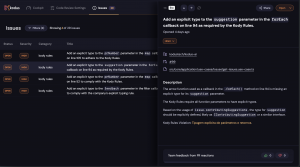When a PR is closed, it is common for some suggestions to be left for later — whether because they were not a priority at that moment or because the team decided to focus on the main delivery.
The problem is that “later” often turns into “never”.
Kody Issues solves this by automatically creating a record of all the suggestions Kody made that were not implemented. It works like a living backlog of improvements, always updated and easy to prioritize.

Where to find it
Open the Kodus dashboard and, in the top menu, click Kody Issues. There you will find the complete list of pending improvements, with:- The original context of Kody’s comment.
- The exact file where the change was suggested.
- The assigned severity (from Low to Critical).

When an Issue is created
Kody Issues only comes into play when the PR is closed. At that moment, Kody reviews all suggestions made in that PR and, if any were not applied, automatically creates an Issue. Rules of type PR (such as title or description) do not generate Issues, only those that apply to files or code snippets. This ensures the list is not cluttered with comments that are less relevant for future maintenance.How automatic resolution works
The best part is that you do not have to manage everything manually. If, in a future PR, someone implements the suggested change, Kody detects this and marks the Issue as Resolved automatically, using code analysis to confirm that the problem was indeed fixed. This keeps the list always up to date and free of “phantom pending items”.Some practical ways to use it daily
🗓️ Run quick technical review sessions
Set aside time at the end of the sprint to review the open issues. This helps bring back points that may have been overlooked during review — especially those with high severity.⚠️ Align on what the team considers a priority
Align with the team on what should be treated ascritical, high, etc.
This keeps the panel relevant and avoids noise from suggestions that do not make sense for your context.



